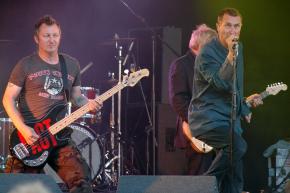“It’s about all artists”
reports on a new union for music artists trying to make ends meet in the digital age.
THE IMAGE of the pampered pop star is an insidious one. But for every artist living the high life, for every Madonna, U2 and Metallica out there, there are hundreds, if not thousands living hand-to-mouth, paying their touring expenses out of pocket, and in debt to their record label even after their second album.
Which is why a union for featured artists has been a long time coming, indeed. Founded in Britain this past April, the Featured Artists Coalition's (FAC) mission is simple and straightforward: "We want all artists to have more control of their music and a much fairer share of the profits it generates in the digital age. We speak with one voice to help artists strike a new bargain with record companies, digital distributors and others, and are campaigning for specific changes."
Ever since Napster hit the scene in the late 1990s, digital distribution has been hailed as "the wave of the future" for music. Well, now the future is here, and while labels are making a killing off the new market, artists are all too often completely cut out. "The digital landscape is changing fast," says Brian Message, manager of acts like Kate Nash and Radiohead, "new deals are being struck all the time, but all too often without reference to the people who actually make the music."

Message's words aren't just hot air. In recent months, major labels have cut deals with everyone from MySpace to Nokia in getting a big slice of the online pie. While the profits reaped from these deals are immense on both sides, neither of these deals involved the actual artist whose music was being bought and sold, and most will barely see a dime. This from the same industry that waxes sanctimonious about "music piracy!"
Shady deals like these abound in the music business. Most record contracts are specifically designed to give artists as little control over their own music as possible. In fact, artists will most commonly be given no legal ownership of their music at all. End result? Labels and distributors make bank, artists get screwed. Sound familiar?
This is something that the Featured Artists Coalition seeks to change. "We want artists to own their copyrights," insists Jon Webster, media contact for FAC. In other words, they want artists to have final say over when and where their music is used, and on what terms. "We think they [the artists] want transparency and to be consulted about the use of their work." Webster also stipulates, however, that ultimately, "the artists will have to decide that when they first meet."
This is, at its core, FAC's reason for being: to give artists in today's music business a sorely needed voice. Since their founding six months ago, the FAC has grown from 60 musical acts to over 650, 500 of which have joined since the coalition's public debut at the In The City music conference in Manchester, England, earlier this month.
ARTISTS WHO have affiliated come from across the board. Groups that have made a name for themselves in recent years like the Kaiser Chiefs and Futureheads have signed the FAC's artists' charter, yet so have longtime veterans like Annie Lennox. Nobody should be surprised to find that stalwart leftists like Billy Bragg or the Gang of Four are vocal supporters. Radiohead, who gave record execs a small case of hemorrhoids last year when they released In Rainbows in online "pay what you can" format, were one of the first acts to sign up.
Kate Nash explained the reason behind her support for the coalition: "I've joined the artists' charter because I think that artists should take control of and responsibility for their own art. And they should be at the forefront of protecting and not just coasting along and being led by people who might not have your best interests at heart."
It would be easy to think membership as little more than a who's who of hot popular artists. But the coalition also includes more than a handful of relative unknowns. Webster asserts that "95 percent of songwriters in the UK make less than £5000 per year from their songs. Sure there are some very successful ones who make a lot of money. This is not just about them, it's about all artists." Like any union worth its salt (the group does receive support from the British Trades Union Congress after all), the FAC seeks to organize all performance artists, big or small.
It's clear that both new and old groups have a lot to gain by joining the coalition. As the industry scrambles to make new profits in new markets (not to mention shrinking economies), the interests of those who actually write and perform the music itself will be guaranteed nothing unless they demand it.
There is a bigger issue at play, though. With financial control comes artistic control--a fact that is sad but true in today's music industry. As long as record labels hold all the strings, then they will be more than happy to pull them away from what's good and toward what's "marketable." If the Featured Artists Coalition can wrest even a little control away from the slick suits and ties, then our music will be all the better for it.
Alexander Billet's music blog is Rebel Frequencies.


